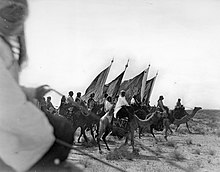Ichwān
The Ichwān ( Arabic الإخوان, DMG al-Iḫwān 'the brothers') were a Wahhabi movement in Saudi Arabia .
To the establishment of the Ikhwan (Brotherhood) in the years 1911 / 1912 , many legends. The official historiography of Saudi Arabia ascribes it to the state founder Abd al-Aziz ibn Saud . It was then brought into being by him to renew the Wahhabi movement. By accepting members across all tribal borders, the particularism of the tribes, which hindered the establishment of a modern state under the Saud dynasty , was to be neutralized . The purpose was also the forced settlement of Bedouins in the oases in order to have more easily recruited troops available for the fighting against other tribes and thus to expand the kingdom.
However, there is also evidence that Ibn Saud only strengthened an already existing movement. In this movement, young Bedouins settled in religious community settlements , the hujar , where they were instructed by scholars in the teachings of Abd al-Wahhab , the founder of Wahhabism . The first settlement is said to have been in al-Artaqiyya 250 km northeast of Riyadh . The Bedouins, who had become fanatical religious fighters, who had little experience with agriculture, then followed the call of Wahhabi preachers to military jihad in order to free the Arabian Peninsula from non-Muslims and not strictly religious Muslims. Above all, the preachers emphasized that, as promised in the Koran , those who fell in jihad would immediately go to Paradise.
Even if the Ichwan troops played a prominent role in the subjugation of the Bedouin tribes and in the war against Hussein of the Hejaz , they became a problem because of their fanaticism and their conservative attitude. Ibn Saud did not comply with their demands to be rewarded for the war effort in the form of land rights in the conquered area. When they then launched attacks on tribes in Kuwait and Iraq , which led to international entanglements, they were defeated in a military campaign until 1929.
See also
literature
- Stephan and Nandy Ronart: Lexicon of the Arab World. Artemis Verlag, Düsseldorf 1972, ISBN 3-7608-0138-2

